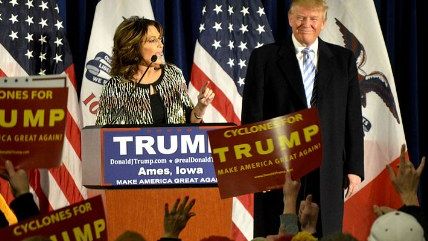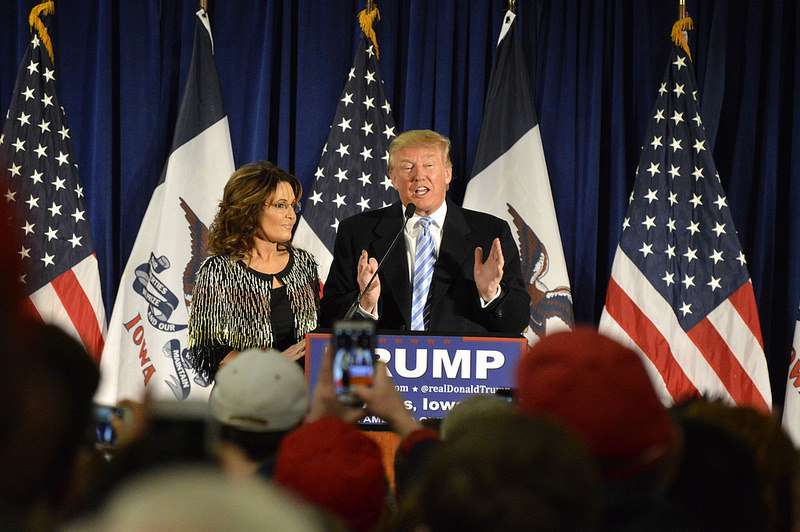How Sarah Palin Led the GOP to Donald Trump
Why is the Republican establishment objecting to the future they helped create?


During Mitt Romney's recent speech denouncing Donald Trump as "a fraud," a stark question arose: How did the Republican Party go, in four years, from nominating a sober grown-up with a record of achievement in the public and private sectors to embracing a loudmouthed playboy with a string of bankruptcies and no experience in government?
Remember when George W. Bush vowed to "restore honor and dignity to the White House"? Those qualities are no longer in demand. Say what you will about Romney, you would trust him with your wallet or your daughter. Trump? Not a chance.
It's not always possible to identify the moment when a journey to destruction began. But in the case of the Republican Party, there is no doubt: Friday, Aug. 29, 2008. That day, presidential nominee John McCain announced that his running mate would be Alaska Gov. Sarah Palin. It was a test for McCain and the GOP rank and file. Both failed, and the party has never recovered.
The problem is not that Palin was a poor candidate who helped drag the ticket to defeat. The problem is that she was celebrated for qualities that were irrelevant and excused for defects that should have been disqualifying. Instead of recognizing her inadequacy, Republicans hailed her backcountry hockey-mom persona, her scorn for the "spinelessness" of elites, her inflammatory rhetoric and her inexperience in the matters a vice president and president have to handle.
Some conservatives weren't caught up in the adulation, but many who should have known better were. Former Dan Quayle speechwriter Lisa Schiffren gushed, "It couldn't get much better than that." Wall Street Journal columnist Daniel Henninger sneered at skeptics who thought Palin didn't "have sufficient experience," commending her as a "grounded, common-sense person."
The late Sen. Fred Thompson, R-Tenn., extolled her at the GOP national convention as "a breath of fresh air" and bragged that she was "the only candidate who knows how to field-dress a moose." Her fiery address sent the delegates into paroxysms of ecstasy.
The ensuing months and years exposed Palin as a glib egomaniac with a penchant for lying who knew little about national and international affairs (and cared less). But none of the discoveries did much damage.
Even after abruptly resigning as governor, she remained a Republican star and a tea party favorite whose endorsement was coveted by GOP candidates. Fox News hired her. She became an annual draw at the Conservative Political Action Conference. Her book Going Rogue sold more than 2 million copies.
Through the years, she made it all about Sarah, the fearless "mama grizzly" who scorned the "lamestream media," referred to the president as "Barack Hussein Obama" and defended waterboarding as "how we baptize terrorists." Her hubris, demagoguery and irresponsibility were a heady mixture that many could not get enough of—and that no one could match.
Until this year, that is, when Trump appeared on the scene and captivated a large share of the electorate. His contrasting biography—a luxury-loving, high-rise-living, Ivy League-educated Manhattan tycoon who would rather play golf than shoot big game—obscures the ways in which he resembles Palin.
Like her, he substitutes certitude for understanding. Like her, he revels in self-infatuation. Like her, he heaps contempt on his critics. Like her, he exploits a pervasive sense of victimhood among whites who distrust minorities. As with Palin, it's the distinctive persona and abrasive attitude that attract followers.
They see Trump as a man of great talents who offends the establishment because he understands and speaks for the common folk. Trump supporters don't care that he has only a shaky grasp of vital issues. Knowledge, many of them obviously believe, is overrated. Ideology is secondary. Gut instincts are what really matter.
That was the appeal of Palin, too. So it was no surprise to see her endorse him. Palin paved the way for a trash-talking narcissist to take over the party. Their partnership was destiny.
William Kristol, editor of the conservative Weekly Standard, wrote recently in opposition to Trump, calling him the "epitome of vulgarity" and his campaign a form of "two-bit Caesarism." But in the summer of 2008, Kristol called on McCain to choose Palin, who fits the same description.
In wrapping its arms around her, the Republican Party sold its soul. Trump is just here to collect.
© Copyright 2016 by Creators Syndicate Inc.


Show Comments (144)